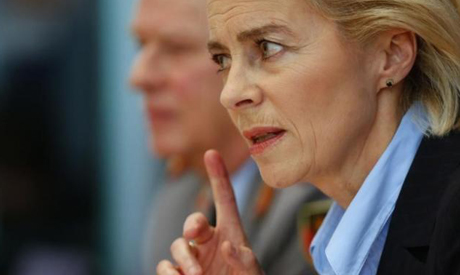
German Defence Minister Ursula Von der Leyen and Chief of Staff of the German Armed Forces Bundeswehr Volker Wieker (L) arrive for a news conference in Berlin, Germany December 3, 2015, on the deployment of German aircraft to Syria. (Photo: Reuters)
Germany may need a bigger army to cope with the more assertive role it has adopted in global missions, the defense minister said on Thursday, a day before parliament votes on joining the campaign against Islamic State group (ISIS) militants in Syria.
Building on Germany's growing confidence on the international stage, Defence Minister Ursula von der Leyen has shown over the last two years a readiness to commit troops to foreign missions. The army is now deployed in more than a dozen countries in Europe, Asia and Africa.
Last year she was a leading proponent of arming Iraqi Kurds fighting IS militants, a major departure for Germany. Friday's parliamentary vote is a direct response to a French appeal for solidarity after militant attacks in Paris killed 130 people.
With many Western partners welcoming the shift in Germany's attitude away from its post-war reluctance to deploy troops, von der Leyen acknowledged that the range of crises posed demands.
"I would not have imagined two years ago what sort of an abyss we would be staring into," she told reporters at a news conference to explain details about Germany's mission in Syria.
That mission, set to be approved by the Bundestag lower house of parliament on Friday, will include sending six Tornado reconnaissance jets, a frigate to help protect a French aircraft carrier, refuelling aircraft and 1,200 military personnel.
However, Germany will not join its NATO allies the United States, France and Britain, or Russia, in staging airstrikes.
In a sign of the shift in German public opinion, a poll for ARD television on Thursday showed 58 percent of Germans backed their country's involvement in the campaign against ISIS.
"BIG DEMANDS"
"It is already clear to me that if the world makes such big demands of us, we must also be open to adjustments in terms of personnel," said von der Leyen, widely seen as a possible successor to Chancellor Angela Merkel.
An analysis into staffing levels and the organization of combat forces is in progress and will report in a couple of months on whether personnel levels are appropriate, she said.
Merkel's coalition government, comprising her conservatives and the center-left Social Democrats, has a big parliamentary majority so the plans are sure to pass on Friday, but the stakes are high for the chancellor.
She has seen her popularity slide after insisting that Germany, Europe's largest economy, take in large numbers of refugees this year, many of them fleeing the Syrian conflict.
Media have dubbed the conflict her "first war" and have highlighted the risks of German pilots crashing in ISIS-held territory.
General Inspector Volker Wieker responded to fears about the state of German equipment, saying that 30 reconnaissance jets were combat-ready, despite reports that about half of Germany's Tornados were not fit for use.
Since the end of the Cold War, the German army has shrunk.
The last reform, in 2011, set a required strength of 185,000 soldiers. More than 3,000 soldiers are currently deployed overseas and the Syria mission will raise that by up to 1,200. Von der Leyen also wants to send 650 soldiers to Mali to help the French campaign against Islamist militants there.
Germany's first overseas combat mission since World War Two was in 1999 when a coalition of Social Democrats and Greens under Gerhard Schroeder agreed to join NATO's intervention in Kosovo.
Since then, there has been a steady increase in the Bundeswehr's overseas activity but Schroeder's opposition to the US-led war in Iraq in 2003 was also a defining moment. Merkel, who at that time was opposition leader, supported that war.
Short link: